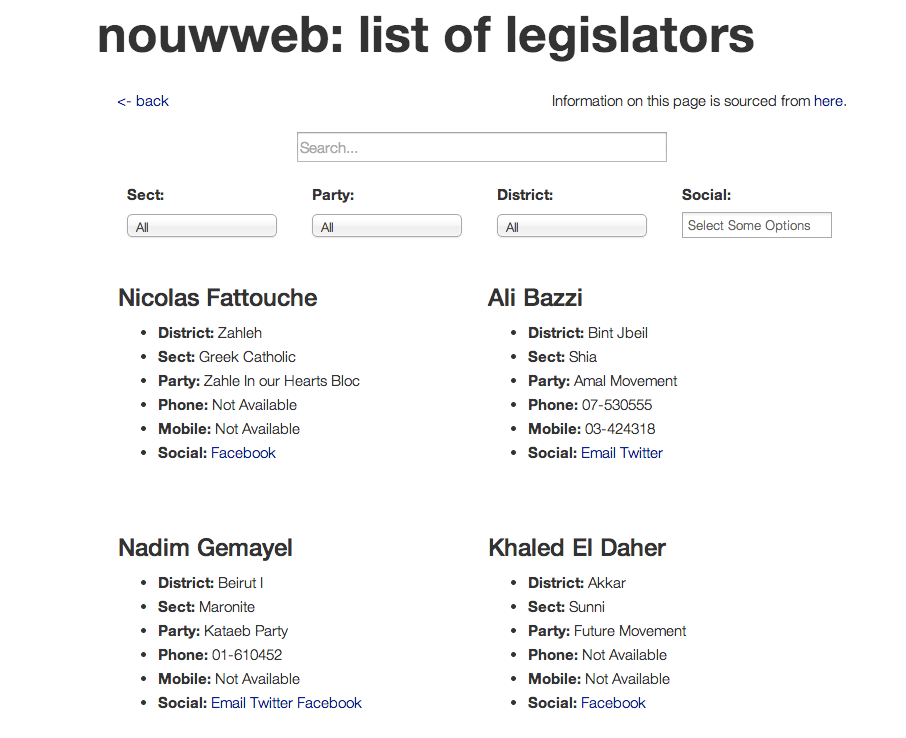This post was first published on [FW: Elections] (http://www.fwelections.com/nouwweb-opening-government-to-empower-citizens-in-lebanon/)
In March of 2013, Democracy International (DI) and Lamba Labs, Beirut’s local hackerspace, joined forces to work on new tools to aid election observation in Lebanon. Social Media Exchange (SMEX), an organization that advocates for a free and open, diverse and dynamic Arab internet, proposed to work with Lamba Labs to create tools exposing publicly available data related to Lebanese Legislators in a project called Nouwweb.
An important decision that Lamba Labs and SMEX made was to publish all the team’s work under permissive open licenses. As Lebanon’s technology sector is still in its infancy with respect to collaboration and resource sharing, Open Election Technology (see Lebanon Election Data, a DI-supported project we conducted in partnership with the Lebanese Association for Democratic Elections [LADE]) would be our model for reproducible research and analysis.
Contact Your Legislator!
Nouwweb organizes and displays information pertaining to the current Lebanese parliament (elected in 2009) including district, sect, party affiliation, phone numbers, email and presence on social media (Twitter and Facebook). The data itself is gathered from multiple websites, but all are publicly available.

|
The data is presented in a searchable, user-friendly phone directory format. You can filter by confession, district or party and immediately get results. The purpose of the tool is to allow citizens to communicate their concerns with their elected representatives. If you are a disgruntled citizen, contact your MP!
A Dive In
We really want to have a conversation with developers, journalists and data enthusiasts. One way to engage the community directly is by building an Application Programming Interface (API), an interface that enables one software program application to communicate with another (hence the name). The Nouwweb API is essentially a program that you can query for information. For example, if you (or another application) want to answer the question ‘Who are the parliament members of Jbeil that have a twitter account?’ all you need to do is access the URL:
http://api.openleb.io/search?district=Jbeil&twitter=true
to get the answer:
[{
 "first_name": "Simon",
"first_name_ar": "سيمون",
"last_name": "Abi Ramia",
"last_name_ar": "أبي رميا",
"gender": "Male",
"gender_ar" : "ذكر" ,
"phone": "",
"fax": "",
"mobile": "03-035902",
"email": "",
"district": "Jbeil",
"facebook": "",
"twitter": "https://twitter.com/SimonAbiramia",
"deputies_terms": "2009",
"party": "Free Patriotic Movement",
"party_ar": "التيار الوطني الحر",
"sect": "Maronite",
"born_day": "6",
"born_month": "3",
"born_year": "1965",
"website": "http://www.simonabiramia.com/Home.aspx",
"other_notes": ""
}]
While not immediately useful to non-programmers, this type of structured data is valuable to developers building their own applications on top of an API. For example, why not build a web application that shows the twitter network of the Lebanese Parliament? Or combine the data with electoral data to visualize the political reach of each parliament member? If you’re looking for inspiration, look at the Clear Congress Project or the Sunlight Foundation’s Open Congress data.
The Nouwweb website itself queries the API to create the contact list. It uses the structured data as seen above to build filters by which a user can pinpoint the representative he would like to communicate with. This is a simple application of the Nouwweb interface, but the possibilities provided by publishing an open data API are endless! We can’t wait to see how developers might use these tools. The code to build the API is also open source and free to view, modify and share and we are always open to contributions.
Importance of Open Election Technology
Open Election Technology uses open data (i.e, data with permissive use licenses) to improve society by disseminating information that can be used for technological innovation, supporting efficiency in election observation efforts, promoting data-driven decision-making, and measuring progress.
Useful data in Lebanon is marked by its scarcity and/or lack of permissive usage licenses. In our talks with entities in the private sector, we find that public domain data whose rights rightfully belong to citizens is usually obtained through less than legal means. It is often resold for profit, and in some cases, back to the government. Entire businesses are built on top of concealed data. If these datasets were rendered public, it would prove a boon to innovation in the private sector and stimulate widespread economic growth.
Published data is important for accountability of public officials. By being opaque about its performance over the years, the government effectively disarms the general public from the tools needed to make a decision at election time. The lack of transparency in government reporting of the news has led journalistic integrity to be disregarded on an almost daily basis, as the media devolves into purely speculative articles. Without accurate open data, organisations attempting to tackle underlying civic problems are practically handicapped.
There is a real need for open data in Lebanon published from government bodies, NGOs as well as private entities. Lamba Labs and SMEX was able to scrape sites for information about the parliament. The alternative would have been for the Lebanese government to provide this information to citizens directly – which would be ideal.
Moving Forward
Lamba Labs and SMEX jointly established OpenLeb as a loose umbrella initiative for open data projects. Members can communicate via the mailing list and contribute to ‘data challenges’, answering problems in civic society through data. In turn, the team is hopeful that this initiative will spur innovation and be a model for data developers and data projects in Lebanon.
Join us and contribute to a growing open data community!
